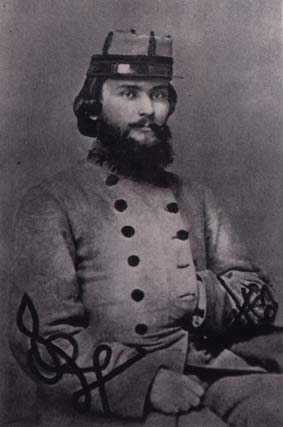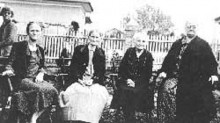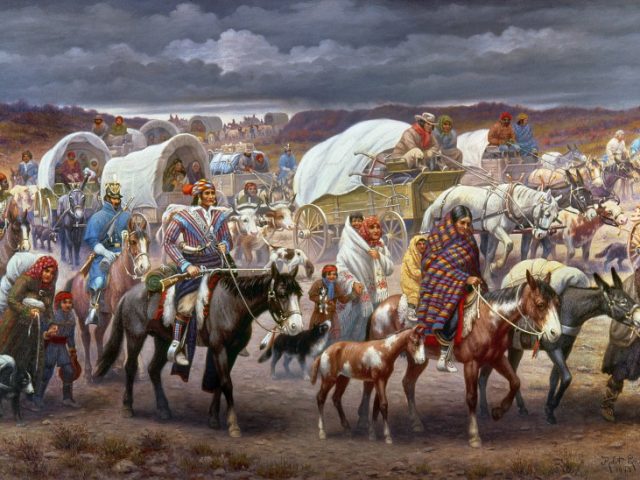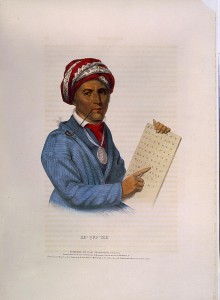Excerpt from
DALE COUNTY AND ITS PEOPLE DURING THE CIVIL WAR
From Reminiscences by Mary Love (Edwards) Fleming (1851-1934)1
PART II
THE OUTBREAK OF THE CIVIL WAR
Some of the Dale County (Alabama) people favored secession and some did not, but the county as a whole voted for it. My Grandfather, Ambrose Edwards, Sr., J. C. Mathews, Hayward Martin, and Ben Martin strongly opposed secession and war, but after the war began they were loyal and did everything in their power to aid the South.
My Uncles, Mordecai White and Hope Mizell, and Judge Crittenden favored secession. I first realized that a terrible war was about to come upon us when our men began drilling in Westville, the village near my Grandfather Edwards’ home.
I had father, uncles, and cousins in the first company that was organized there, so it was with mingled feelings of pride and sadness that we watched them drill in their handsome new uniforms. Their leader was Colonel Brooks, a veteran of some other war—Indian or Mexican, I suppose. The company was later Company E, 15th Alabama Infantry Regiment. Its officers were Captain Esau Brooks; First Lieutenant William A. Edwards; Second Lieutenant, J. F. Jones; Third Lieutenant, Lon Bryant. A young man named Hildebrand was fifer and leader of the band. This information I got from Uncle Young Edwards who was a member of this Company who is still living.
This company left Westville, July 15, 1861, with eighty-six men and was recruited during the war to two hundred and forty. One hundred and forty of these never returned. Of the one hundred who did return, as far as I can learn, only about thirty are now (1902) living. Of the eighty-six who first went into the army, a mess of eight men was formed; William A. Edwards, Billy Mizell, Billy Mobley, J. P. Martin, Ben Martin, Young M. Edwards, Ambrose Edwards, and James R. Edwards. None of these eight lost a limb, but all were wounded in some way. Young and Ambrose Edwards were in prison at Ft. Delaware. Ambrose was captured at Gettysburg in July 1863 and was released in October 1864.
I did not understand or realize the horrors of war
I had heard the older people talk and read much of the prospect of war, but as I was young I did not understand or realize the horrors of war at that time. I did not even think seriously of what it meant until the company was organized and the ladies of the neighborhood began to make uniforms for our soldiers.
These uniforms were made of white osnaberg, a heavy cotton cloth, with blue stripes on the trousers and the jackets. I remember how I thrilled with pride and pleasure as we watched our soldiers marching to the music of the drum and fife, carrying their flag so proudly, and dressed in their white uniforms.
Before many weeks our company joined the 15th Alabama Regiment as Company E. and was sent to Virginia and served in General Lee’s Army. That regiment was famous for its bravery and gallantry. William C. Oates, who was governor of Alabama long after the Civil War, and who was a general during the Spanish-American War was Colonel of this regiment.
Col. William C. Oates

To get to the railroads the companies from Dale and adjoining counties marched through the country to Union Springs, seventy miles away, or to Montgomery, eighty miles away, or to Eufaula, forty miles away. From these places, they were sent to Virginia or to the Tennessee Army.
My father did not leave with the first company
My father, Leroy M. Edwards, had a wife and six young children to care for, so he did not leave with the first company but stayed at home several months so as to put his business affairs in condition for a long absence.
My three uncle’s, Ambrose, Young, and William Edwards, and several cousins left with the first company organized. They left in 1861 as soon as there was a call for volunteers. My father remained at home a few months longer, then he, too, left us. He joined Company E, 53rd Alabama Regiment of the Mounted Infantry. Such a regiment was sometimes called the cavalry, but the men were armed as Infantry. The colonel was “a”1 M. W. Hannon; the captain was R. F, Davis; the second lieutenant was John W. Dowling, and my father was Third Lieutenant. I do not recall the name of the First Lieutenant. Jack Leonard was a drummer, and Bill Jones was a bugler.
Dowling with some others organized this company, which left home August 27, 1862, to march to Montgomery, eighty miles away, where it was mustered into service and became a part of the 53rd Alabama Regiment. This regiment belonged to General Joe Wheeler’s Division of the Tennessee Army. It served for some time under General Nathan B. Forrest, took part in the pursuit of Colonel Straight, and later joined General Hannah’s Brigard in Dalton, Georgia. It followed Sherman in Georgia and South Carolina and surrendered at Columbia, South Carolina.
In 1864, Lieutenant Dowling was wounded by the explosion of a shell and was permanently disabled for active service. He returned home and as soon as he was able he joined the Home Guards, whose duty it was to oppose invasion at home, to keep order, and to capture deserters. Shortly after the close of the war, he was located at Ozark, where he became a prosperous merchant.
Lieutenant Edwards, my father, was knocked down and stunned by a piece of shell, but he was not seriously hurt. He sent a piece of shell home, and when I was married in 1873, my mother still had it. But it was afterwards lost, probably when my mother broke up housekeeping after my father’s death in 1898. She had also, for many years, a light colored wool hat with a bullet hole in it which was shot into it in a battle while on my father’s head. This hat was probably lost at the same time that the piece of shell was lost.
Father was taken prisoner twice in the same day during the fights in 1864 around Atlanta but he escaped each time from his guards. They were marching him and another man along a road, the guards mounted and the prisoners on foot. When they came to a thick growth of woods by the roadside, the prisoners darted suddenly into these woods. The guards shot at them but missed them, and they could not follow on horseback, by the time they had dismounted, the prisoners were so far ahead they could not be recaptured. Taken prisoner again, this ruse was again tried and proved successful. Father said that when in front of Sherman’s Army in Georgia he was under fire for one hundred days. So he had three very narrow escapes but was spared to return home to us, stronger and in better health than when he entered the army. He lived until 1898 when he died at my home in Brundidge, Alabama, while on a visit. He brought home from the war two guns and a third short one called a carbine, think, and a sword.
Fleming relatives in the military
There were three of my husband’s Fleming relatives in the 15th Alabama Regiment. Ben Fleming, his oldest brother, was only eighteen or nineteen years old when he left home with Company E at the first call made for volunteers. Colonel Oates,”b”2 the Colonel of this Regiment, said that Ben was a good soldier. He was badly wounded in battle near Richmond in February 1865. The wound was in his arm, the bullet entering just above the hand and coming out near the elbow. His hand is drawn and shrunken now from that wound. The hospital doctor wished to amputate his arm, but Ben would not consent to this. He had been slightly wounded once before, but he did not return home at all during the war until he received the severe wound in his arm in 1865. Then he came home and was unable to return to the army.
George Fleming, a cousin of my husband, was in the same company and died in some hospital. Dawson Fleming, another cousin, was also a member of Company E. He was captured at Gettysburg, had smallpox while in prison, and did not return home until June 1865. Dawson had two brothers in the army, Edward and Tom Fleming, but they were in another company. Henry, James, and Jeff Fleming, cousins of my husband, were the only other Fleming relatives who served in the war that I knew personally. They all lived in or near Clintonville, Alabama, and all of them returned home except George.
My husband, William LeRoy Fleming, enlisted during the latter part of 1864 when he was sixteen years old, and he served until the surrender of the forces in Florida. He belonged to the 5th Florida Regiment of Calvary, and at one time he was sent to help guard prisoners at Andersonville Prison.
There were other Fleming cousins who went into the Confederate Army from other places from Georgia and from Louisiana but I never knew them. Jeff Fleming married my cousin, Nettie Mizell soon after the close of the war and moved to Ennis, Texas. Jeff’s brother went into the army from Louisiana and was killed. My cousins John Mizell and John Bennett both died in the hospital and Asbury Bennett another cousin, was severely wounded. Our neighbors, John Chalker’ Ben Byrd, Isaac Ardis, and Jake West were killed in battle.
The following is a list of the relatives whom I knew personally and who went into the Confederate Army from our community and nearby:
- Ambrose Edwards
- Asbury Bennett
- Benjamin Fleming
- Berry Edwards
- John Bennett
- Dawson Fleming
- Greene Edwards
- Edward Fleming
- James Edwards
- Amos Mizell
- George Fleming
- LeRoy M. Edwards
- Charles Mizell
- Henry Fleming
- William Edwards
- Luke Mizell
- James Fleming
- Young Edwards
- John Mizell
- Jeff Fleming
- Charles Edwards
- William Mizell
- Thomas Fleming
- William L. Fleming
In the Home Guards were my uncles, Spencer Edwards, Hope Mizell, and Mordecai White. My Uncle William Mizell, my mother’s brother, enlisted in the army in Columbus, Georgia, and was killed during the first or second year of the war. Members of other Mizell and Edwards families entered the army from Russell County and from places in Georgia, but I did not know them personally.
My Uncle Young Edwards told us that the soldier’s pay of $13.00 a month was often paid for one meal and that towards the close of the war the soldiers seldom got their pay. Mr. Yancy L. Bryan, one of our neighbors after the war, enlisted when he was about seventeen years old, served two years and received no pay at all. He said that on one occasion he was excused from going into battle because he was barefoot and the soldiers had to go through a thick briar patch. He was told by his captain to go to the rear and do something else. Mr. Bryan was taken prisoner soon after, and was sent to Fort Douglas near Chicago, and did not return home until June 1865. He told us that while he was a prisoner some of the officials often tried to persuade him and other prisoners to take the oath of allegiance to the United States, and then go to the West to fight the Indians. But Mr, Bryan refused, saying that he would remain in prison rather than do such a thing; that he would fight nowhere but for his own country. He said that the prison fare was very dry, but that there was enough of it, and that the prisoners were well treated. Confederates who, to escape prison, went to fight the Indians were called “galvanized Yankees.”
1“a” Moses W. Hannon 53 Partizan Rangers.
2“b” Wm. C. Gates Maj.-Lt. Col.-Col.
1Material furnished by Col. Thomas Spencer, for the Alfred Holt Colquitt Chapter, United Daughters of the Confederacy, Atlanta, Ga
SOURCE
- Excerpt Transcribed from The Alabama Historical Quarterly, Vol. 19, No. 01, Spring Issue 1957





Thank you for this enjoyable history!